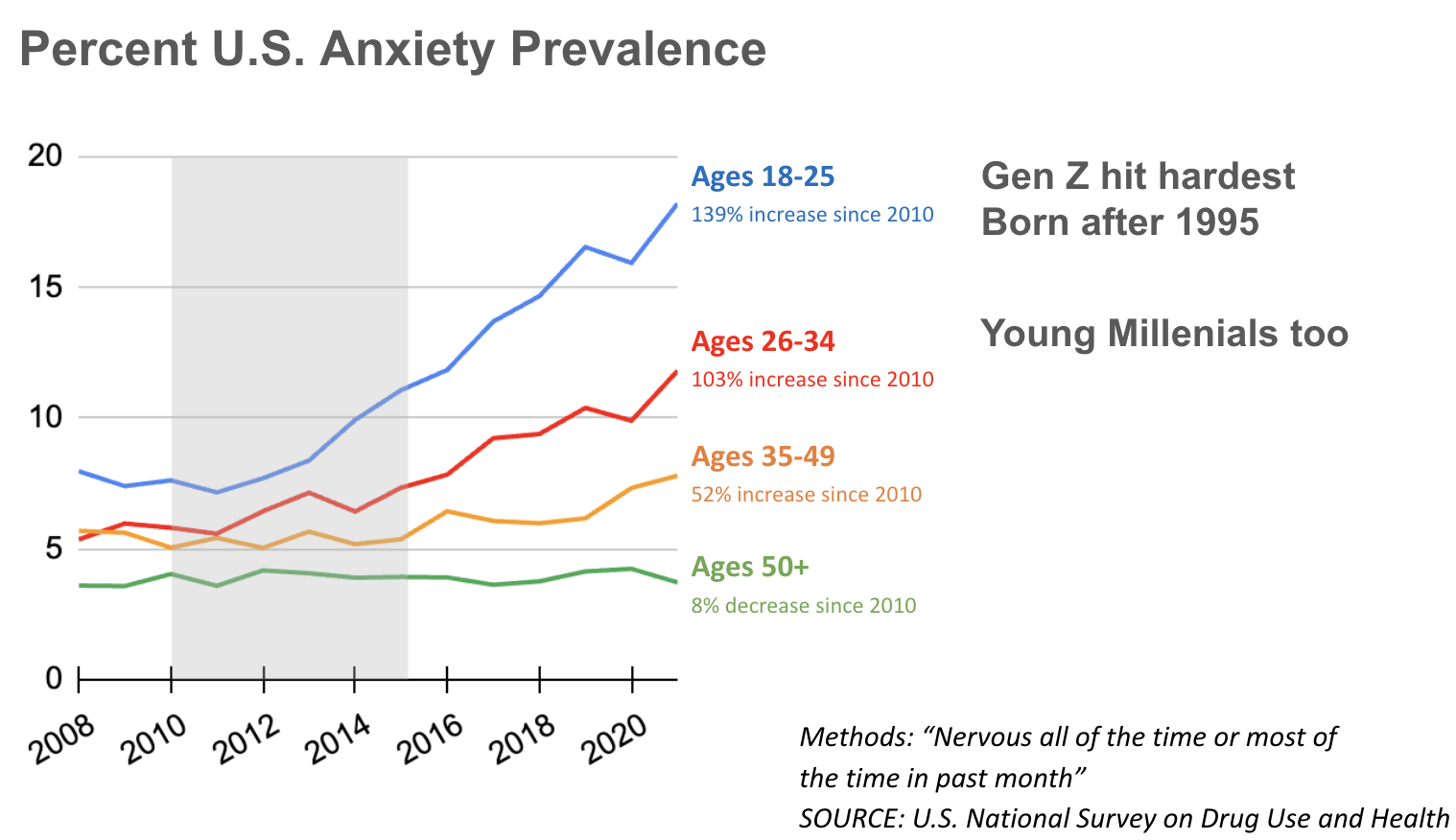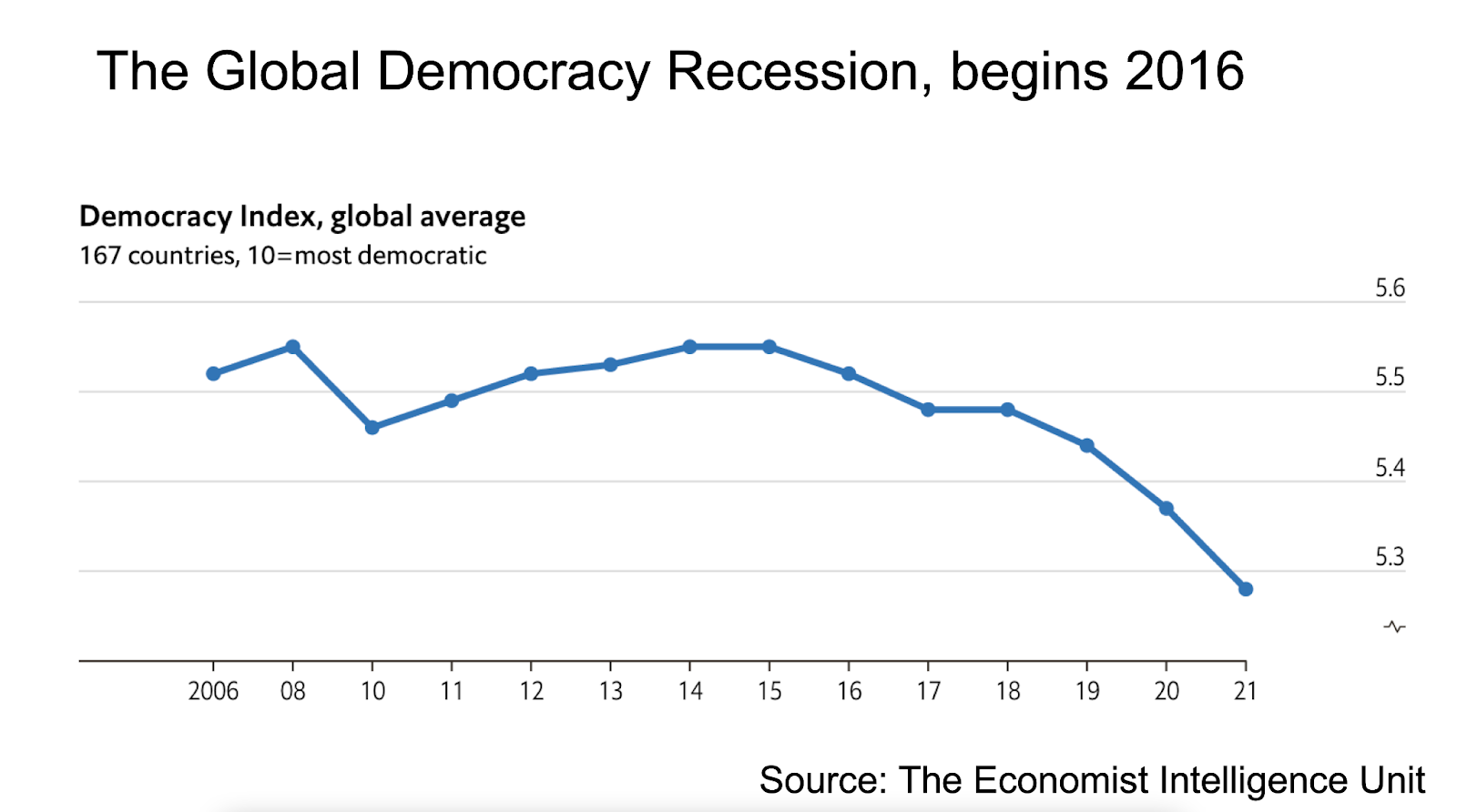Social Media
For my most updated research, see anxiousgeneration.com.
1. The two questions I have been studying, along with my main writings for the general public:
A) Is social media a major contributor to the rise of adolescent anxiety and depression that began in the early 2010s?
- Haidt, J. (2021). The Dangerous Experiment on Teen Girls. The Atlantic. This essay gives a narrative overview of the case that social media is a major cause of harm to teen girls.
- Haidt, J. (2022). Testimony to Senate Judiciary Committee. This 12 page document lays out the evidence point by point, drawing on the two collaborative reviews below. Here is the video of my testimony (starting at 50:30).
- Haidt, J., Rausch, Z., & Twenge, J. (ongoing). Adolescent Mood Disorders Since 2010: A Collaborative Review. This document collects and organizes dozens of published studies documenting changes in adolescent mental health in the U.S. and UK in the 21st century
- Haidt, J., Rausch, Z., & Twenge, J. (ongoing). Social Media and Mental Health: A Collaborative Review. This document collects and organizes dozens of published studies that address the question of whether social media is a major cause of the rapid rise in adolescent depression, anxiety, self-harm, and suicide in the U.S. and UK since the early 2010s.
- I am currently summarizing all of this work in a book titled The Anxious Generation, which will be published in March 2024.
- I have some older advice (from 2019) on two pages of TheCoddling.com: Better Mental Health, and Wiser K-12 Schools
- Here is my Atlantic article suggesting a simple and essential reform we can make right now: Get Phones Out of Schools Now.
- I have started the After Babel Substack, which presents findings as I write two books on the effects of modern digital technology.
- Here is the most important post from the Substack: Social Media is a Major Cause of the Mental Illness Epidemic in Teen Girls. Here’s the Evidence.

B) Is social media causing an increase in political dysfunction?
- Haidt, J. (2022). Why the Past 10 Years of American Life Have Been Uniquely Stupid. The Atlantic. This essay is my main statement. It gives a narrative overview of the case, drawing on the collaborative review below. It is a precis of the book I am now working on: Life After Babel: Adapting to a world we may never again share, due out in 2025.
- Haidt, J. (2022). Yes, Social Media Really is Undermining Democracy, Despite What Meta Has to Say. The Atlantic. Meta responded to my “Uniquely Stupid” article, giving me a chance to respond to them and develop my argument further. I say what each of us can do as individuals, which I had neglected to address in the original essay.
- Haidt, J., & Rose-Stockwell, T. (2019). The Dark Psychology of Social Networks. The Atlantic. Tobias has deep knowledge of social media and the tech community. Combining his expertise with mine on moral psychology, we laid out exactly how the architectural changes made to Facebook, Twitter, and other platforms between 2009 and 2012 caused the social and political chaos of the late 2010s.
- Haidt, J., & Bail, C. (ongoing). Social Media and Political Dysfunction: A Collaborative Review. This document collects and organizes more than a hundred published studies that address the question of whether social media is a major contributor to the rise of political dysfunction and the decline of democratic health that occurred in the USA and other Western democracies in the 2010s.
- I am currently summarizing all of this work in a book titled Life After Babel: Adapting to a World We Can No Longer Share, which will be published in 2025.
2. Academic articles on social media and adolescent mental health:
- Haidt, J. (2020). A guilty verdict. Nature, 578, 226-227. [Nature forum debate on social media and mental health, paired with Nicholas Allen].
- Twenge, J. Haidt, J., Joiner, T., & Campbell, W. K. (2020). Underestimating digital media harm. Nature Human Behavior. [This is a response to Orben & Przybylski, 2019, who had reported that the association between adolescent well-being and digital technology use was no larger than the association of well-being with “eating potatoes.” We show that Orben and Przybylski made six analytical decisions that resulted in lower correlations, and that when you zoom in on social media for girls, and only control for demographic variables, not psychological ones, the associations are much stronger.]
- Twenge, J., Blake, A. B., Haidt, J., & Campbell, W. K. (2020). Commentary: Screens, teens, and psychological well-being: Evidence from three time-use-diary studies. Frontiers in Psychology, 11, Article 181. [This is our response to a different article by Orben & Przybylski (2019), on diary studies. We show, once again, that when you zoom in on girls using social media, rather than all kids using all screens, you find substantial associations with bad mental health outcomes.]
- Twenge, J., Haidt, J., Blake, A. B., McAllister, C., Lemon, H., & Le Roy, A. (2021). Worldwide increases in adolescent loneliness. Journal of Adolescence [We found the only global measure of adolescent mental health, buried in the PISA dataset on educational outcomes. When you look at the 6 questions related to loneliness at school, you find a global increase in loneliness that begins between 2012 and 2016, which matches our findings for the mental health crisis in the USA, UK, and Canada. See our summary of the findings in this New York Times op-ed]
- Twenge, J. M., Haidt, J., Lozano, J. & Cummins, K. M. (2022). Specification curve analysis shows that social media use is linked to poor mental health, especially among girls. Acta Psychologica, 224. [This is our strongest response to Orben & Przybylski, 2019. We re-ran their SCA analyses, on the same large datasets, and showed that when you reverse their analytical decisions–especially to include psychological controls and to mix boys and girls–you find much larger correlations, between social media use and harm, for girls, equivalent roughly to r = .20, which is quite large for a public health threat.]
3. My video lectures/interviews about social media:
First: Here is a Youtube playlist with all of my talks on social media’s effects on teen mental health and democratic norms and institutions. Plus a few comedy clips on the topic. A few of the videos stand out as the most important ones:
My most complete presentation was on the Lex Fridman podcast in June of 2022. I directly address and rebut Mark Zuckerberg’s claims––made on Lex’s podcast a few months earlier––that social media is, on the whole, good for teen mental health and for democracy.
On the Joe Rogan show, 2019, I laid out the evidence that smartphones/social media plus overprotection are the two major causes of the adolescent mental health crisis that began in the early 2010s. We talk about what we’re doing with our own kids. I argue for the importance of free range childhoods; Joe disagrees. Below is a 20 minute clip. Full two-hour discussion is here, Episode 1221.
On 60 Minutes, 2022, I talked about how social media is causing “structural stupidity” and damaging American democracy:
At the 2023 ExcelinEd National Summit on Education, I give my first public talk on The Anxious Generation.
In The Social Dilemma, I talked about the rising rising cost of social media use on adolescent mental health.
4. Additional resources:
- Political Reform Imperatives [early stage collaborative review doc, building off of the reforms proposed in my “Uniquely Stupid” article. Not ready for prime time. Curated with FixUsNow.org]
- Social Media Reforms [Created with Zach Rausch and Camille Carlton from The Center for Humane Technology]
- Haidt, J. & Park, Y (ongoing). Free Play and Mental Health: A Collaborative Review. (This document collects and organizes the published studies addressing the question: would more free play, especially in elementary school, reduce rates of depression and anxiety disorders? The decline of free play may be a large part of the backstory of the teen mental health crisis that began around 2012. This is the beginning of a collaborative review; we have not yet sent it out for contributions and critiques from other scholars)
- The Ledger of Harms — a list of research publications on seven different areas of harm caused by social media. At the Center for Humane Technology, where I am an advisor.
- The Social Dilemma, a documentary about the effects of social media on mental health and society.
- Psychology of Technology Institute, where I am on the scientific advisory board.
- Here is the outline of my next book, The Anxious Generation. It will be published by Penguin Press in March 2024.
- Here is the outline of the second book I am writing, Life After Babel: Adapting to a world we can no longer share. It will be published by Penguin Press in 2025.
5. Collaborative review documents:
When I began to study the effects of social media on adolescent mental health, in 2019, I found it impossible to keep track of the many conflicting studies. I started collecting the most important ones in a Google document, then I started organizing them by method, and then I invited other academics to tell me what I had missed or gotten wrong. These publicly visible “collaborative review” documents make it easy for anyone to acquaint themselves with the research literature on the many topics listed below. They offer the abstract and a direct link to each study. I invite any academic researcher to request editing permission for any of the docs and then add studies, comments and objections. Most are curated by Zach Rausch and me, sometimes along with an expert on that topic. You can view all of the Google docs at jonathanhaidt.com/reviews.
